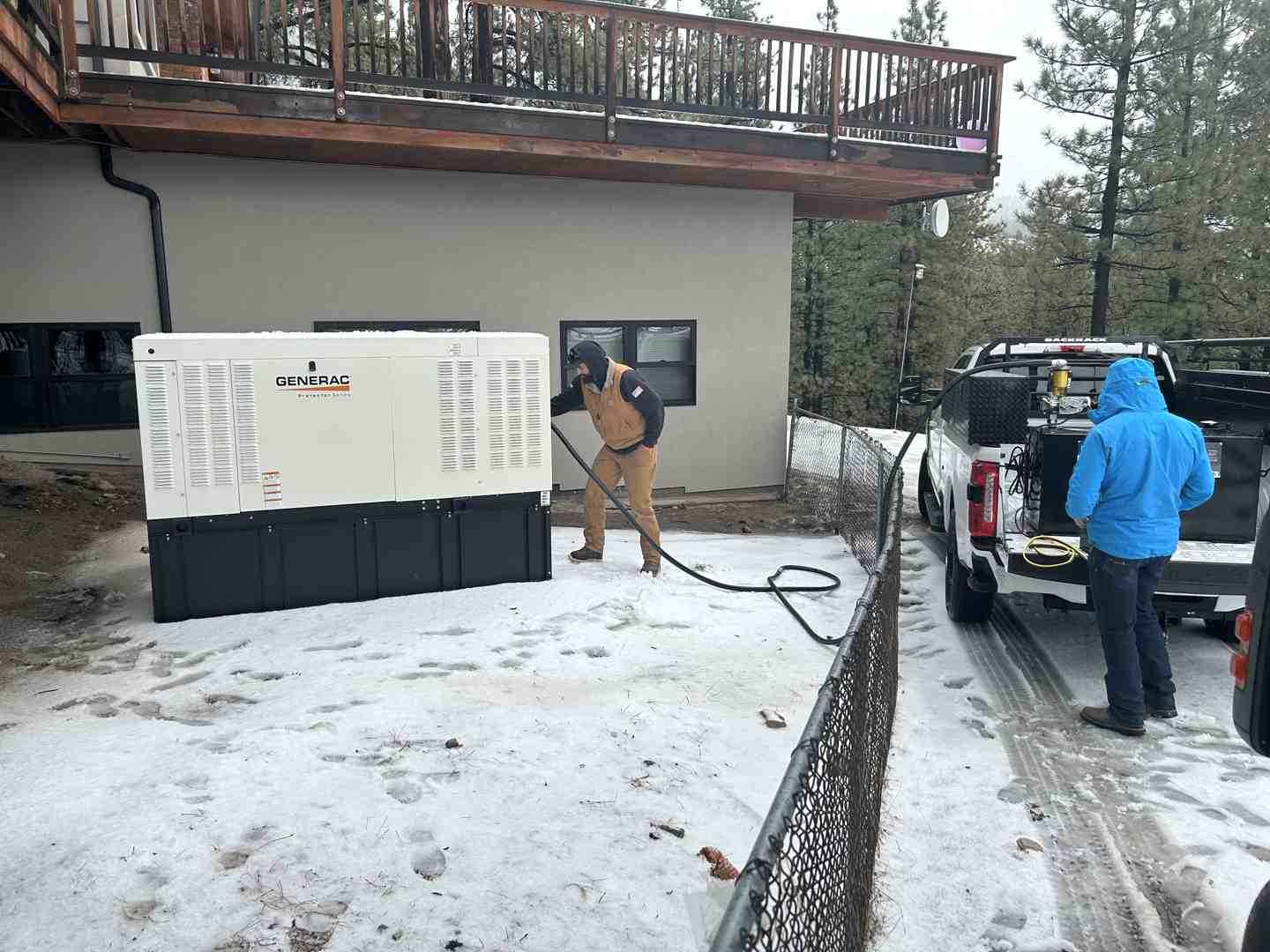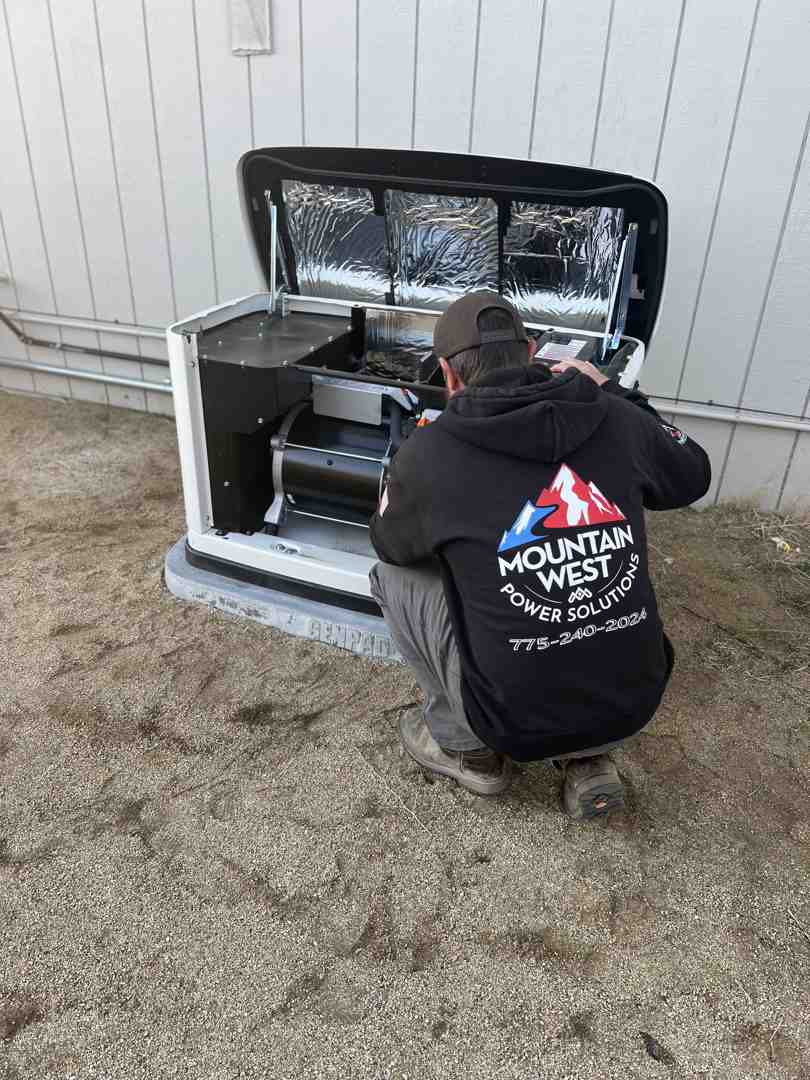When the power goes out, your generator becomes a lifeline for your home or business. But what happens when that backup system fails too? An emergency generator repair for unexpected generator problems.
If your generator fails during an outage, first check for simple issues like dead batteries, fuel problems, or tripped breakers before calling for professional help. These common problems often have straightforward fixes that can get your power running again quickly. Taking a few minutes to investigate can save you time and money on unnecessary emergency repair calls.
We understand how stressful power outages can be, especially when your backup plan isn't working. Regular maintenance is the best way to prevent generator failures, but knowing what to do when problems arise is equally important. The right response can mean the difference between a quick fix and an extended period without power.
In this article, you’ll learn how to handle emergency generator repair when your backup power system fails unexpectedly.
Let’s break down the key points you should consider:
- Signs your generator needs urgent repair
- What to do immediately when your generator fails
- When not to force a restart and avoid further damage
- Why emergency generator repair should be handled by a pro
- Why call Mountain West when your generator fails during an outage
- Preventing future emergencies with proper maintenance
Let's dive in!
Signs your generator needs urgent repair
Recognizing when your generator requires immediate attention can save you from being left in the dark during critical moments. Certain warning signs indicate serious problems that shouldn't wait for regular maintenance.
Generator not starting during a power outage
When the power goes out and your generator fails to start, you're facing an emergency situation. This failure often stems from battery issues - dead or corroded batteries are common culprits. Check for loose battery connections first, as these can be easily fixed.
Fuel problems are another likely cause. Your generator may have:
- Stale fuel that's degraded over time
- Empty fuel tank (check the gauge)
- Clogged fuel filters preventing proper flow
If the starter motor makes clicking sounds but the generator doesn't turn over, you likely have an electrical system problem. In winter, cold weather can thicken oil and make starting difficult.
We recommend keeping a basic troubleshooting checklist near your generator for power outage situations. Many starting issues require professional emergency generator repair services.
Unusual noises or smoke during operation
Abnormal sounds or smoke from your generator indicate serious internal problems that need immediate attention. Grinding or scraping noises often point to metal-on-metal contact, which can quickly destroy engine components.
Excessive smoke signals improper combustion. Black smoke typically means the engine is running too rich (too much fuel, not enough air). Blue smoke indicates oil burning, possibly from worn piston rings or valve seals.
Other concerning sounds include:
- Backfiring (loud popping)
- Knocking (rhythmic tapping)
- Sputtering (irregular running)
Any unusual smell, especially burning odors, warrants shutting down the generator immediately. These symptoms often precede complete failure, so don't ignore them during a power outage when you're relying on backup power.
System alerts or emergency stop signals
Modern generators include sophisticated monitoring systems that detect problems before they cause catastrophic damage. When your generator displays warning lights or triggers an emergency stop, take these signals seriously.
Common alerts include:
- Overheating warnings: Often caused by cooling system failures or blocked air intakes
- Low oil pressure: Indicates insufficient lubrication that can quickly damage the engine
- Overload indicators: Show the generator is working beyond its capacity
Some systems feature automatic shutdown mechanisms that activate when they detect dangerous conditions. This protective measure prevents further damage but leaves you without power.
If your generator has a digital display, record any error codes before calling for emergency generator repair. These codes help technicians diagnose problems faster. Never override or bypass safety systems, as this can lead to fire hazards or permanent equipment damage.
What to do immediately when your generator fails
When your generator stops working during a power outage, quick action can help restore power before the situation becomes critical. Staying calm and following these systematic steps will help you identify and potentially solve the problem without professional help.
Check the fuel level, oil, and battery connections
First, check if your generator has enough fuel. This might seem obvious, but empty fuel tanks are one of the most common reasons generators fail. Make sure the fuel is fresh too, as old fuel can become contaminated and prevent proper operation.
Next, inspect the oil level using the dipstick. Low oil levels can trigger automatic shutdowns in many modern generators. If the oil appears dirty or hasn't been changed recently, this could be causing your problems.
Finally, examine all battery connections. Look for corrosion, loose wires, or damaged cables. Clean any corroded terminals with a wire brush and ensure all connections are tight and secure. A weak or dead battery won't provide the necessary power to start your generator.
Reset the emergency stop on your generator (including Generac units)
Many generators, especially Generac models, have emergency stop buttons that may have been triggered accidentally. These safety features immediately shut down the generator when pressed. Locate the bright red emergency stop button on your control panel and make sure it's in the proper position.
For Generac units specifically, you'll need to turn the main switch to the "OFF" position, wait 30 seconds, and then switch it back to "AUTO" or "ON" to reset the system. This simple reset solves many common generator failures.
We also recommend checking your generator's circuit breakers. These can trip when the generator is overloaded. Look for any tripped breakers on the control panel and reset them by flipping them completely off then back on again.
When not to force a restart and avoid further damage
Knowing when to leave your generator alone can save you from costly repairs and dangerous situations. Sometimes trying to restart a failing generator can cause more problems than it solves.
Don't force it: When trying to restart can do more harm
If your generator makes unusual grinding noises or emits smoke, don't attempt to restart it. These are clear warning signs of serious mechanical issues that require professional attention.
When you smell fuel around your generator, stop immediately. Forcing a restart could create sparks that ignite leaked fuel, leading to fire or explosion. Always prioritize safety over convenience.
Never restart a generator that's been submerged in water. Water damage compromises electrical components and creates shock hazards. Let a qualified technician inspect it first.
If the generator shuts down repeatedly after brief operation, this indicates an underlying problem. Continuous restart attempts can overheat components and cause permanent damage.
We recommend checking oil levels before any restart attempt. Running a generator with insufficient oil can destroy the engine within minutes.
Bold text = never force a restart without addressing these issues first:
- Burning smell or visible smoke
- Oil pressure warning lights
- Unusual vibrations or movement
- Control panel error codes
- Recent fuel or oil leaks
Why emergency generator repair should be handled by a pro
When your generator fails during a power outage, professional help becomes essential. DIY repairs can void warranties and create safety hazards that certified technicians are trained to avoid.
Diagnosing deeper electrical issues
Professional generator technicians have specialized tools to identify problems beyond what's visible to the untrained eye. We often see customers who attempted simple fixes only to discover their generator had multiple underlying issues.
Certified HVAC and generator specialists can quickly pinpoint problems with:
- Fuel delivery systems
- Battery connections and charging circuits
- Control board malfunctions
- Automatic transfer switch failures
These complex electrical issues require proper testing equipment and expertise. When a technician diagnoses your generator, they'll check the entire system—not just the obvious symptoms. This comprehensive approach prevents recurring failures during future outages.
Many generator problems stem from electrical faults that can damage other components if left unaddressed. Professionals know how these systems interact and can prevent cascading failures.
Protecting your home's power system from further damage
Amateur repairs often lead to more expensive problems. Incorrectly connecting generator components can send power surges through your home's electrical system.
When we repair generators, we:
- Ensure proper voltage regulation
- Verify grounding connections
- Test transfer switch operation
- Check for potential backfeed issues
These safety measures protect not just your generator but your entire home power system. Improper repairs can damage sensitive electronics throughout your home or even create fire hazards.
Professional technicians also understand manufacturer specifications and code requirements. We'll make sure your generator operates within safe parameters to prevent premature wear and system damage.
How certified HVAC and generator techs ensure faster recovery
During an outage, time matters. Professional technicians restore power faster through:
Immediate Parts Access: We maintain inventories of common replacement parts or have supplier relationships for quick delivery.
Systematic Troubleshooting: Our diagnostic processes eliminate guesswork, allowing us to find problems faster.
Experience with Your Model: Certified technicians work with various generator models daily and know their common failure points.
Complete Testing: After repairs, we fully test the system under load to ensure it will perform when needed.
When emergency generator service is needed, professional technicians also provide documentation of repairs that maintains warranty coverage. This protects your investment and ensures continued support from the manufacturer.
Why call Mountain West when your generator fails during an outage
When backup power goes down in the middle of a blackout, you don’t need guesswork, you need a licensed team that can stabilize the situation, diagnose fast, and bring the system back online safely.
Mountain West’s electricians are trained on portable and standby systems (including Generac) and follow a safety-first, code-informed process: verify fuel and battery conditions, confirm oil pressure and cooling airflow, assess the ATS (automatic transfer switch) logic, and test voltage/frequency under staged load before declaring the system “ready.”
You’ll get clear findings and next-step options (temporary load-shed, targeted repair, or right-size replacement) so you’re not left in the dark.
Triage-first diagnostics to restore power safely and quickly
Emergency repairs start with securing people and property, then restoring stable power, not just “getting it to start.” Our triage sequence is structured to avoid cascading damage:
- Safety & stabilization: We verify CO/ventilation, shut down unsafe attempts, and inspect for fuel or oil leaks. We confirm correct generator placement/clearances and check for obvious hazards (scorched wiring, loose terminations, damaged cords).
- Fast-start root checks: Battery voltage/terminals and charge circuit, fuel quality/pressure (NG/LP), carburetor/fuel delivery on gasoline units, air filter restriction, and low-oil shutdowns. These account for a majority of no-start calls.
- ATS & controls review: We confirm sensing, contactor operation, and neutral/grounding scheme, then pull any controller error codes. For units stuck in “run but no power,” we isolate whether the fault is generator-side or switchgear-side.
- Staged load verification: With hazards cleared, we bring on essential circuits first (refrigeration, HVAC blower, medical devices), monitor voltage and Hz stability under step loads, and identify which large loads need rotation or delay starts to avoid nuisance trips.
- Action plan you can act on: You’ll receive a concise decision tree, temporary load-shedding plan to get through the outage, targeted repairs (e.g., AVR, carb service, battery/charger, ATS components), or a right-size replacement if capacity or condition won’t meet your needs.
This approach restores confidence without risking engine damage, brownouts, or unsafe backfeeding, and gives you a written path to full reliability once the grid returns.
Finance urgent repairs or a right-size replacement (0% for 18 months)
Blackouts don’t wait for budgets. Mountain West offers 0% interest for 18 months on qualifying emergency projects through Synchrony, so you can restore safe power now and spread costs out, without interest during the promo period.
Financing isn’t limited to new installs; it can cover diagnostics, parts, labor, permitting, and commissioning for:
- Critical fixes: Battery/charger replacement, carburetor or injector service, regulator and fuel-line remediation (NG/LP), oil-pressure/fan faults, and immediate cooling/airflow corrections.
- Electrical stability: AVR (automatic voltage regulator) replacement and calibration, alternator/stator testing, re-termination of overheated conductors, and ATS (automatic transfer switch) repair or service-rated replacement.
- Right-size upgrades: If triage shows your unit cannot carry essential circuits, we’ll quote a properly sized Generac standby (pad, gas coordination, service-rated ATS, commissioning) and map it to a predictable monthly payment.
How we structure it, fast, clear, actionable:
- Bundle the scope (triage + repairs/ATS + commissioning) into one monthly payment.
- Show repair vs. replace side by side with the lowest monthly option for each.
- Lock promo terms online in minutes: Financing.
Use financing to stop unsafe workarounds (extension-cord daisy chains, overloaded circuits) and restore a code-compliant solution you can trust through the outage.
Get an instant emergency quote and see your lowest monthly payment
During an outage, you need numbers now, not after a dozen calls. Mountain West’s Estimate Builder gives you a rapid, no-pressure quote for emergency repairs or a right-size replacement, and shows the lowest monthly payment available via our Synchrony financing.
What you’ll enter (2–3 minutes):
- Symptoms (won’t start, starts/no power, trips under load, smoke/odor, error codes).
Generator details (portable/standby, fuel type, approximate kW, age). - Essential circuits you must keep on (HVAC blower/AC compressor, refrigeration, medical devices, well/sump, networking).
- Site notes (panel location, gas availability, clearances, HOA/noise limits).
What you’ll get instantly:
- A scoped emergency plan: triage visit + targeted repair items (battery/charger, carb/fuel service, AVR, ATS) or a right-size standby quote with pad, gas coordination, service-rated ATS, and commissioning.
- Monthly payment estimates keyed to promotional financing (0% for 18 months on qualifying projects).
- A hold-the-line load plan (which circuits to run first, which to rotate) to keep essentials powered until service arrives.
Preventing future emergencies with proper maintenance
Regular generator maintenance is the key to avoiding emergency repairs when you need power most. Proper care extends your generator's life and ensures it works when you face unexpected outages.
How long a generator can sit unused before failing
Most generators shouldn't sit unused for more than 30 days without being started and exercised. After 90 days of inactivity, fuel begins to degrade, forming deposits that clog fuel systems and carburetors.
Diesel generators face additional challenges as diesel fuel can develop algae growth after just 30 days. This biological contamination damages fuel systems and reduces efficiency.
Natural gas generators may avoid fuel degradation issues but still need regular operation to prevent seals from drying out and components from seizing. Even standby generators connected to home gas lines should be tested monthly.
We recommend starting your generator at least once a month and running it under load for 20-30 minutes. This keeps internal components lubricated and identifies potential problems before an emergency.
Regular testing and maintenance scheduling
Create a consistent maintenance schedule based on your generator's manufacturer recommendations. Most home generators require quarterly, semi-annual, and annual service checkpoints.
EPA regulations limit emergency generators to 100 hours per year of combined maintenance and testing, with no more than 50 hours allowed for non-emergency readiness checks, ensuring compliance and helping prevent overuse or regulatory fines
Monthly Tasks:
- Run the generator for 20-30 minutes under load
- Check oil and coolant levels
- Inspect for fuel or oil leaks
- Clean exterior debris
Quarterly Tasks:
- Change oil and filters (or per manufacturer hours)
- Check battery connections and charge
- Inspect belts and hoses for wear
Annual Professional Service:
- Replace spark plugs and air filters
- Test transfer switch operation
- Check fuel system components
- Verify all safety shutdowns work properly
Document all maintenance in a logbook with dates and services performed. This history helps identify recurring issues and proves warranty compliance.
Backup power plans and home readiness
Develop a comprehensive power outage plan that goes beyond generator maintenance. Keep enough fuel stored safely for at least 72 hours of operation during extended outages.
To ensure your generator is ready when needed, the U.S. Department of Energy recommends monthly scheduled maintenance combined with reliable fuel supply, reinforcing consistent backup power readiness.
Install carbon monoxide detectors near your generator location and in sleeping areas. These detectors save lives by warning of dangerous exhaust gas buildup.
Prepare your home's electrical system by having a licensed electrician install a proper transfer switch. This prevents dangerous backfeeding and protects utility workers.
Create a priority list of which appliances and systems must remain powered. Most home generators can't run everything simultaneously, so know what's essential:
- Heating/cooling systems
- Refrigeration
- Medical equipment
- Well pumps
- Basic lighting
We recommend keeping a generator repair service contact programmed in your phone. When problems arise, having immediate access to professional help reduces downtime.
Conclusion
Being prepared for generator issues can save you stress during power outages. We recommend keeping basic tools and your generator manual easily accessible at all times.
Remember to prioritize safety when dealing with generator problems. Never attempt repairs during storms or when standing in water.
Regular maintenance is your best defense against unexpected breakdowns. Schedule professional inspections at least once a year to keep your generator in top condition.
Having a reliable electrician's contact information stored in your phone can make emergency situations less stressful. Many services offer 24/7 support for critical power needs.
While some minor issues can be solved at home, complex repairs should always be left to professionals. Attempting difficult fixes yourself can lead to more expensive repairs or safety hazards.
By following the steps we've outlined throughout this article, you'll be well-prepared to handle generator emergencies. Your family's comfort and safety during power outages depends on taking quick, appropriate action.
Call us now for urgent generator repair to restore your backup power system quickly and safely during an outage.








